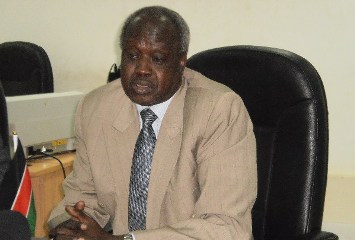Kiir not interested in “infinite” post-secession talks with Sudan
February 25, 2013 (JUBA) – South Sudan’s president, Salva Kiir Mayardit, said he sees no rationality in engaging in infinite talks with the government of neighbouring Sudan from which his country seceded in 2011 following a referendum under a self-determination clause in a 2005 peace deal which ended decades of conflict.

Foreign affairs minister Nhial Deng Nhial said the president had met with African leaders in Addis Ababa to discuss the need to “double up efforts” to resolve the new nation’s ongoing dispute with Sudan once and for all.
Nhial, who was part of delegation accompanying the president, made the remarks after returning from the Ethiopian capital where he attended the signing of a UN-backed peace deal aimed at breaking hostilities and delivering stability in the neighbouring Democratic Republic of Congo, where M23 rebels are battling government forces in the country’s east since 2009.
“[Kiir told them – especially our African neighbours and the regional leaders who have an in-depth knowledge and understanding of our problem with Sudan – to explore ways to break infinite negotiations”, Marial told reporters on arrival at Juba International Airport on Sunday.
“The president made it very clear that it is the African leaders [who] should take the issue between and the Republic of Sudan more seriously. He told them to act instead of [supporting] infinite talks”, he added.
It’s not the first time the president has spoken critically of the constant cycle of discussions with Khartoum, which have so far failed to yield few results, telling African leaders at an African Union Peace and Security Council (AUPSC) meeting in January that it was time to “shift from rhetoric to action” and decide on a binding framework.
While stressing his country supports Congo peace efforts, Nhial said resolving the long-running dispute with Sudan was a pressing importance closer to home, asserting a trust-building process was needed to break the stalemate.
“Sudan needs to come out of rhetoric and move forward to implement the September agreement which we have signed. This is how we can build trust. Trust cannot be built by the use of violence. Trust can be built through dialogue and by honouring promises that have already been made,” he said.
“It is my hope that the Republic of Sudan will abide by international norms and make the right choice so that the trust-building process can move forward,” adding that such steps are urgently needed to tackle the worsening security situation unfolding in border areas.
He maintains no country would tolerate any action that threatens the lives of the people and the security of the two nations.
“The whole world needs peace. They need stability and this is the path we are pursuing to end the conflict”, Nhial said.
South Sudan and its northern neighbour signed a number of peace deals last September brokered by the African Union (AU) and aimed at ending a number of outstanding issues between the two countries, regarding border demarcation, setting up a buffer zone and the final status of the disputed Abyei area.
However, implementation of the agreements has stalled, amid differing interpretations of the signed deals, with a series of recent AU-led talks failing to reinvigorate the process. Both sides accuse each other of deliberately undermining the peace process and showing a lack of commitment to resolving differences.
The situation has caused a stalemate between the two countries, with Khartoum refusing to accept passage of South Sudan’s oil flows through its territories unless Juba ends its alleged support for SPLM-N rebels, which is fighting the Sudanese army in the north’s restive Blue Nile and South Kordofan states.
(ST)
